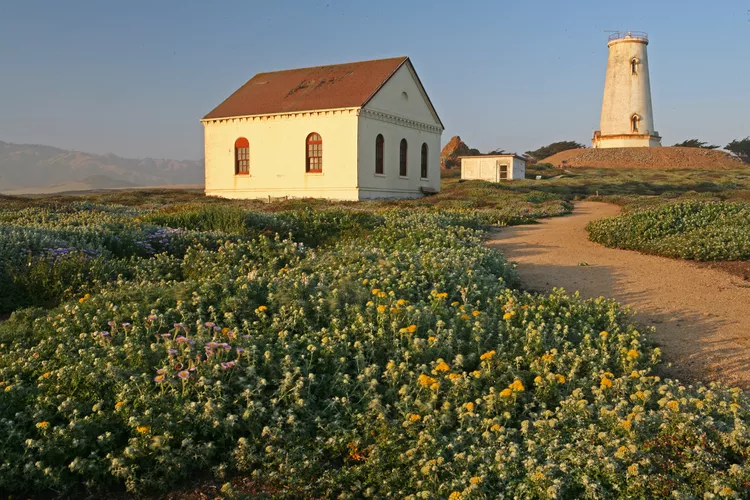Summary
What You Can Do at Piedras Blancas Lighthouse
You can witness the beauty of the Piedras Blancas Lighthouse during a guided tour that occurs a few days a week. For the latest schedule, you can check the current schedule at their website. Reservations are not necessary. While visitors are allowed inside the lighthouse building, access to the tower is restricted.
In the vicinity, you will discover the famous Hearst Castle. During the winter months, visitors can also observe elephant seals from an overlook near Highway One.
A short drive north will take you to the charming town of Cambria. Here, the Fresnel lens from the Piedras Blancas Lighthouse is displayed on Main Street, right next to the Lawn Bowling Club. Additionally, you can explore the head keeper’s house located on Chatham Street, which was transported in the 1960s.

Piedras Blancas Lighthouse’s Fascinating History
The site for Piedras Blancas was selected in the early 1870s to bridge the light gaps between Point Conception and Point Sur. Initially, $70,000 was allocated for this project, with construction commencing in 1874 and completed in 1875.
Although the land had been designated for a light station as early as 1866, it reverted to Don Juan Castro in 1874. Castro, who owned Rancho Piedra Blanca, was not in favor of the lighthouse project, yet it proceeded nonetheless.
Captain Ashley, who also oversaw the Point Arena lighthouse’s construction, was in charge of building the Piedras Blancas lighthouse. The local rock posed significant challenges, requiring a change in plans to build around it rather than through it.
The lighthouse tower reached a height of 100 feet and featured a first-order Fresnel lens crafted in France, allowing its light to be visible from 25 miles away. Its signature flash occurred every 15 seconds. Initially, lightkeepers resided in temporary shanties, but a permanent Victorian-style house was completed in 1875, along with additional structures built in 1906.
Captain Lorin Vincent Thorndyke was the first lightkeeper, serving from 1876 until his retirement in 1906. Although details about his successors are scarce, it is known that the U.S. Lighthouse Service operated the lighthouse until 1939, when the U.S. Coast Guard took over.
In 1916, the lighthouse’s light signature changed to a double flash every 15 seconds. After an earthquake in 1948 caused damage, the upper levels of the lighthouse were removed, reducing its height to approximately 70 feet.
By 1949, an electric beacon replaced the original kerosene lamp. The station became automated and unmanned in 1975, leading to its closure in 1991. The Bureau of Land Management received the facility in 2001, allowing tours to resume in 2005.
Today, Piedras Blancas is once again a functional navigation aid, flashing a signal every 10 seconds.
Visiting Piedras Blancas Lighthouse
The guided tours typically last about two hours and require approximately half a mile of walking. Be mindful that tours may be canceled in adverse weather conditions.
A tour fee is collected for participation; however, pets are not allowed. Reservations are not required.
Getting to the Piedras Blancas Lighthouse
The Piedras Blancas Lighthouse is conveniently located on California Highway 1 at 15950 Cabrillo Highway, just north of San Simeon. You can easily see it as you drive along the highway.
Tours begin at the former Piedras Blancas Motel, situated around 1.5 miles north of the lighthouse.





